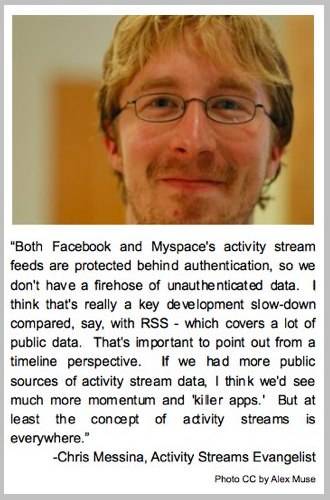Chris Messina grew up in New Hampshire, the Live Free or Die state. As a high-schooler in the early 90’s he held his school’s website hostage after being suspended for running an ad on it for a controversial gay rights group. Now Chris is nearing 30, today was his 29th birthday, and he just announced that he’s taken a job at one of the biggest, most powerful corporations in the world.

The latest chapter in the fascinating story of Chris Messina’s life ends with one of the most high-profile young proponents of an Open and Distributed Web joining Google, a company that aims to organize all the information in the world and a behemoth that many free spirits online eye with ambivalence. What will the future bring for Messina and his work? A look at how he got to Google might offer some clues. It isn’t all pretty, some people worry about what the move will mean for the web, but the announcement is definitely important for all of us.
Where Chris Messina Comes From
Chris Messina grew up in a well-to-do suburb in New Hampshire. As a teenager he railed vocally against a middle class culture that he says he now realizes he was very much a part of. One of his biggest influences, though, was a grandmother with strong Libertarian tendencies.
When Chris entered high school, the web was in its earliest days. He became the school’s web master, setting up and running its first web site. A group of students at the school wanted to start a Gay/Straight Alliance support group and were facing some resistance from parents and school officials. Messina took it upon himself to post a free banner ad promoting the organization on the school’s official web site. He got suspended from school and pulled the site down in protest. (Even in those early days a school librarian had backed up some of the files, so the situation ended without young Messina being paddled or tied to the rack.)
After high school Chris went to college at Carnegie Mellon, where he studied Design. That Design training took him far in the tech world and will be an important part of his new job.
After graduating from college, Messina went on to build an incredible resume of accomplishments recognized around the world.
When Messina speaks about any of the above, the biggest companies on the web listen. He’s widely respected, but some people say he’s become an arrogant power player at the front of a small parade of outspoken self-appointed leaders. That he gets all the credit when there are other, quieter, people doing a significant portion of the work. That’s one perspective, but it’s not the most common one and many of the leaders of the circle Messina runs in have shipped products that power the fundamentals of the web we all use today.
- He designed the full-page ad in the New York Times announcing the launch of Firefox. Thousands of people donated $10 each to buy that ad, heralding an Open Source, community-based challenge to Microsoft’s Internet Explorer.
- He co-founded BarCamp, the now international network of technology and culture “unconferences” that you may have heard of and should definitely attend next time there’s one in your town.
- He was integral in the building of the international co-working community, a network of organizations that help each other serve independent, web-based workers who seek a physical space and support infrastructure.
- He is a Board member of the OpenID Foundation, the organization working on standards and adoption of open, federated and portable systems of identity for use around the web.
- He’s a leading voice in the movement to create an Activity Streams standard that will allow user activity data to be shared and understood from one website over to another.

Now Chris Messina will be at one of the biggest and most important companies around. Today on his 29th birthday, Messina announced he was taking a job at Google, with the title Open Web Advocate.
Has Chris Messina sold out? “There are many legitimate reasons to work for a larger enterprise,” social web sociologist danah boyd, who recently joined Microsoft, told us in response to Chris’s move. “Some are practical: health insurance, stable income, and all of the other benefits that tend to come with such a package. But some come from the same ethos that entrepreneurs have… the desire to ship a product. Where you don’t have to do every inch of legwork. And where you know that your work can touch millions. There’s also something to be said for being around a whole lot of really smart people.”
On Landing at Google
Messina has worked at a wide variety of startup companies. Most recently he was at OpenID provider Vidoop, one of a number of high profile hires the company made while it was still based in Oklahoma. In September 2008, Vidoop put its 40 person crew in a crazy caravan to its new headquarters in Portland, Oregon. In May, 2009 the company imploded, closed its doors and told some of its employees it couldn’t pay back wages. Messina shared his account of what happened on his blog.
The next half year Messina spent doing independent consulting, including a month and a half project with Mozilla. The fruits of that labor will be released to the public soon, he told us today.
In September Messina was making the rounds, talking to a variety of companies in Silicon Valley and told a friend at Google that he was considering joining a big company as his next step. His Google contact told him that the company had a strong preference for hiring engineers, rather than people with the skills that Messina has. Doug Bowman, Google’s first ever staff designer had made a high-profile departure to join Twitter just a few months prior, saying that Google didn’t appreciate design.
Messina left feeling like that door was closed and considered launching his own startup company. Over the next few months a few other companies offered Messina positions, he said, but then his old Google contact pinged him again and asked if he was still interested in joining Google.
What had changed? His contact told him that Google was placing a new emphasis on getting the social web right, in a way that is good for the web. That month Google publicly launched a campaign that had run informally inside the company for two years, called the Data Liberation Front. It works across departments to enable users to remove their data from Google services, a key part of the vision of an Open Distributed Web that Messina has been working toward.
“I went in for the interview,” Messina told us today, “and 2 weeks later they made me a great offer letting me do what I was already doing. Yes, the interview process was long but very efficient, and I had to complete 1 logic problem (which I almost nailed, but alas, I’m no Joe Smarr!)” Smarr is the widely respected developer that had been working on these same matters at Comcast Plaxo until announcing that he was joining Google in December.
Messina told us that he’s excited to learn how to organize for an Open web from inside a very large company. It’s a perspective he’s never had before, but one that will lend him more credibility in his efforts to move other large companies.
What This Means for the Web
Messina and Smarr join a growing and impressive roster of Googlers dedicated to building an Open, Distributed web. That’s a vision that’s the opposite of a centralization and control – the typical model of financial success for a large company. This team of people will have to battle inertia, corporate interests and the natural tendency many people say is inherent in a large organization to bring more and more of a market under its control.
Google controls a growing size of our search, our advertising sales, our email, our document collaboration, our mapping, our voice communication and much more online. The company is almost sure to face anti-trust legal pressure someday soon.
It’s always been a part of Google’s DNA to support what’s good for the web at large, the more people use the web the more they’ll click on AdSense. This much centralization of power is cause for concern, though. It’s as if Google is set to have a battle against itself. It’s staff against the nature of its economy of scale.
The culture of the corporation may be more important than its size, though. David Recordon, an open web advocate that works closely with Messina and recently joined social networking giant Facebook, had this to say: “Personally, I love how Facebook’s culture lets me continue working on what I’m passionate about while having a tremendous impact on both the technology industry and the world at large. I hope that as my friend, Chris is able to do the same at Google.”
The day to day reality of effecting change may be more complex than that, though. Yahoo’s Eran Hammer-Lahav, the best-known technologist working to develop and support open login standard OAuth, raises an important concern.
“This is clearly a big win for Google,” he told us. “Messina and Smarr are huge assets in the social web space.”
“My concern is specific to Google. With Messina, Smarr, [inventor of OpenID and more Brad] Fitzpatrick and others all working for Google, focusing on the Social Web, there is less and less incentive for Google to reach out. Google has a strong coding culture which puts running code ahead of consensus and collaboration. Now with so many bright minds in house, they are even less likely to reach out.
“A week ago, you would have to get at least Google, Plaxo, and Messina (representing the independent voice) to collaborate. This week it’s just Google.
“While I am certain that Messina and Smarr will keep their independent voices, and am not suggesting they will ‘sell out’ or alter their principles, they no longer need to surface many of their ideas out to the community. They can just have an quick internal meeting and ship products.”
What will going to Google mean for the rebellious young man who’s become such a big personality agitating for the open web outside of the biggest companies on the web? What does it mean that the biggest companies, especially Google and Facebook, keep hiring outside social web technical leaders? Time will tell, but Messina says he’s been told explicitly that people for whom “it’s all about them” don’t do well at Google.
The company must be full of formerly big personalities now working as part of a team. PubSubHubbub co-creator and now Googler Brett Slatkin once as a brash college freshman told Newsweek that “If I made a great product, and Microsoft offered me a lot of money, I would spit in their faces.” (That’s one of my favorite quotes.) Now Slatkin has toned it down and talks tech without the bombast.
Messina says he knows it’s going to be a big change and is excited to see what being part of Google is like. So the next chapter of the story of Chris Messina will be a part of the next chapter of the story of Google.
Like this post? Read: What could all this look like in the future? See one vision in our article Toward a Value-Added User Data Economy
ReadWriteWeb also profiled Chris Messina in The Real-Time Web and its Future a report about the real-time Web, the thought leaders and companies shaping this market. Based on more than 50 interviews with industry leaders like Chris Messina and John Borthwick and insights into companies like Twitter, Warner Brothers and Nozzl Media, it’s a must read for information technology decision makers, innovators and thought leaders.









